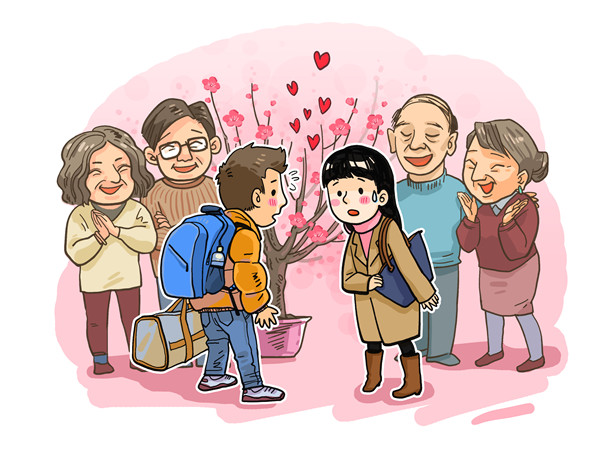College students under pressure to tie knot
 |
|
Photo by Liang Luwen/China Daily |
More than 30 percent of university students were pressured by their families to attend blind date or matchmaking when they returned home during the recent winter holiday, a survey has found, according to a report by China Youth Daily.
Out of the 927 students polled by China University Media Union across the country, 27 percent of them said their families had urged them to consider a blind date or matchmaking as they were worried about their single status. While 6 percent said their families had planned blind date or matchmaking for them.
Matchmaking is a traditional way for single Chinese men and women in their 20s and 30s to meet. It has become especially popular amid the rising number of so-called "leftover" people — well-educated, highly paid young professionals who find it increasingly hard to find a mate.
Zhao Ming, a senior at a university in Tianjin, said his parents had arranged three potential partners to meet him during the holiday. He added that this was a good way to find or meet his Mrs Right because his family knows him and would find "proper" girls.
Zhao said he's anxious as his peers are getting married.
However, not everyone shares Zhao's view. The survey shows that 28 percent of the students said they reject the idea of matchmaking or blind date.
Wang Lin, a student at a university in Beijing, said she believes matchmaking would make her feel no "passion for love" at all.
She said she would rather find her true love in a way she likes and not by the standards of her parents.
The reason why some students do not like matchmaking and blind date is that they hope two persons should start as friends and get to know each other before they commit to a relationship, said Zhou Jun, a psychology teacher with China Youth University of Political Studies.
Liao Zhengtao, a psychology teacher with Southwest University for Nationalities, said it's normal for the younger generation to marry late, which was rarely seen in their parents' generation.
When the society's economy and wealth developed to a higher level, young people would naturally be nurtured for a longer time by their family , he said.



















